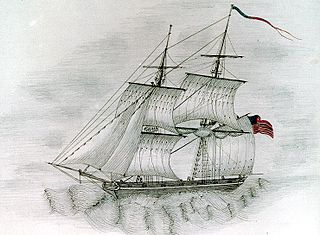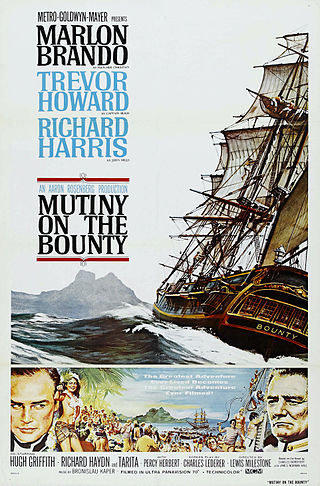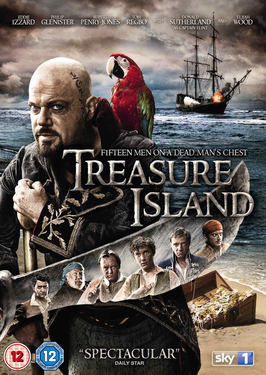
The Caine Mutiny is a 1954 American military trial film directed by Edward Dmytryk, produced by Stanley Kramer, and starring Humphrey Bogart, José Ferrer, Van Johnson, Robert Francis, and Fred MacMurray. It is based on Herman Wouk's Pulitzer Prize-winning 1951 novel of the same name.

Sir Peter Alexander Ustinov was a British actor, filmmaker, and writer. An internationally known raconteur, he was a fixture on television talk shows and lecture circuits for much of his career. Ustinov received numerous accolades including two Academy Awards, a BAFTA Award, three Emmy Awards, and a Grammy Award.

Terence Henry Stamp is an English actor. Known for his sophisticated villain roles, he was named by Empire as one of the 100 Sexiest Film Stars of All Time in 1995. He has received various accolades including a Golden Globe Award, a Cannes Film Festival Award, and a Silver Bear as well as nominations for an Academy Award and two BAFTA Awards.

Billy Budd, Sailor , also known as Billy Budd, Foretopman, is a novella by American writer Herman Melville, left unfinished at his death in 1891. Acclaimed by critics as a masterpiece when a hastily transcribed version was finally published in 1924, it quickly took its place as a classic second only to Moby-Dick among Melville's works. Billy Budd is a "handsome sailor" who strikes and inadvertently kills his false accuser, Master-at-arms John Claggart. The ship's Captain, Edward Vere, recognizes Billy's lack of intent, but claims that the law of mutiny requires him to sentence Billy to be hanged.

The second USS Somers was a brig in the United States Navy during the administration of President John Tyler. It became infamous for being the only U.S. Navy ship to undergo a mutiny which led to executions.

The Spithead and Nore mutinies were two major mutinies by sailors of the Royal Navy in 1797. They were the first in an increasing series of outbreaks of maritime radicalism in the Atlantic World. Despite their temporal proximity, the mutinies differed in character. The Spithead mutiny was a simple, peaceful, successful strike action to address economic grievances, while the Nore mutiny was a more radical action, articulating political ideals as well, which failed.

White-Jacket; or, The World in a Man-of-War is the fifth book by American writer Herman Melville, first published in London in 1850. The book is based on the author's fourteen months' service in the United States Navy, aboard the frigate USS Neversink.
Billy Budd is a short novel by Herman Melville.

Billy Budd, Op. 50, is an opera by Benjamin Britten to a libretto by the English novelist E. M. Forster and Eric Crozier, based on the short novel Billy Budd by Herman Melville. Originally in four acts, the opera received its premiere at the Royal Opera House (ROH), London, on 1 December 1951. Britten later revised the work into a two-act opera, with a prologue and an epilogue. The revised version received its first performance at the ROH, Covent Garden, London, on 9 January 1964.

H.M.S. Defiant is a British naval war CinemaScope and Technicolor film from 1962 starring Alec Guinness and Dirk Bogarde. It tells the story of a mutiny aboard the fictitious title ship at around the time of the Spithead mutiny in 1797. It was directed by Lewis Gilbert with a screenplay by Nigel Kneale from Frank Tilsley's novel Mutiny (1958). The film's world premiere occurred at the Odeon Leicester Square in London's West End on 22 February 1962.

Mutiny on the Bounty is a 1935 Metro-Goldwyn-Mayer drama film directed by Frank Lloyd and starring Charles Laughton and Clark Gable, based on the 1932 Charles Nordhoff and James Norman Hall novel Mutiny on the Bounty.

Mutiny on the Bounty is a 1962 American Technicolor epic historical drama film released by Metro-Goldwyn-Mayer, directed by Lewis Milestone and starring Marlon Brando, Trevor Howard, and Richard Harris. The screenplay was written by Charles Lederer, based on the novel Mutiny on the Bounty by Charles Nordhoff and James Norman Hall. Bronisław Kaper composed the score.

The Sea Wolf is a 1941 American adventure drama film adaptation of Jack London's 1904 novel The Sea-Wolf with Edward G. Robinson, Ida Lupino, John Garfield, and Alexander Knox making his debut in an American film. The film was written by Robert Rossen and directed by Michael Curtiz.

Jim Hawkins is a fictional character and the protagonist in Robert Louis Stevenson's 1883 novel Treasure Island. He is both the protagonist and main narrator of the story.

Pirates of Treasure Island is a 2006 American comedy-drama film produced by The Asylum, loosely adapted from Robert Louis Stevenson's 1883 novel Treasure Island.

Treasure Island is a two-part British television drama adaptation of the novel Treasure Island (1883) by Robert Louis Stevenson. The screenplay was written by Stewart Harcourt, produced by Laurie Borg and directed by Steve Barron. It was made by BSkyB and first shown in the United Kingdom on Sky1 on 1 & 2 January 2012. It was re-released a year later on Pick on the 14 February 2013 and 21 February 2013.

The Somers Affair was incident on board the American brig USS Somers while on a training mission in 1842 under Captain Alexander Slidell Mackenzie (1803-1848). Midshipman Philip Spencer (1823-1842) was accused of plotting a mutiny that would kill those who opposed him and then use the Somers as a very fast, well-armed pirate ship. Spencer was arrested and executed, along with two other alleged co-conspirators, Samuel Cromwell and Elisha Small, when the Somers was thirteen days away from shore. The three were hanged without a court-martial following a hastily assembled shipboard meeting. The ship then returned to New York. An inquiry and a court martial both cleared Mackenzie. There was enormous public attention, most of it unfavourable to Mackenzie.

Billy Budd is a play by Louis O. Coxe and Robert H. Chapman based on Herman Melville's novella of the same name. Originally titled Uniform of Flesh, the play premiered Off-Broadway in 1949. Coxe and Chapman restructured and retitled the work for its Broadway debut in 1951. The revised version was a critical success, winning the Donaldson Award for Best First Play and the Outer Critics Circle Award for Best Play in 1951. In 1952 the play was adapted for the television anthology series Schlitz Playhouse of Stars, and Peter Ustinov adapted the play into a film which premiered in 1962.
Robert Harris Chapman was an American playwright and longtime academic of English literature and drama at Harvard University. He is best remembered for co-authoring the 1951 Broadway play Billy Budd, adapted from Herman Melville's novel of the same name, with Louis O. Coxe. Their play won the Donaldson Award for Best First Play and the Outer Critics Circle Award for Best Play in 1951.

















